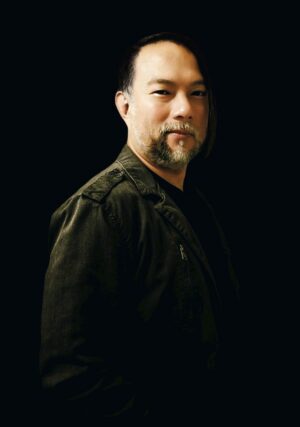Native Hawaiian and Pacific Islander Heritage in Horror Month: An Interview with Jason Tanamor

What inspired you to start writing?
I’ve always occupied my time with stories through various mediums like television or books. It was escapism for me. It wasn’t until I started watching the cartoon Super Friends that I began to imagine “what if?” type episodes. Like, what if Superman was flying during a solar eclipse? When the moon passes between the earth and the sun, would Superman lose his ability to fly during the obscuration since the yellow sun gives him his powers? What would that story look like? The inspiration comes from stories or narratives that don’t already exist.
What draws you to the horror genre?
I love all types of genres, but with horror specifically, I love the way the stories affect all your emotions. In one instance you can feel tension, then fear, then uncertainty, and then tension again. In Vampires of Portlandia, I tried to scare you with tension and then actual fear to keep you off balance. If you can provoke different emotions in a reader, then your story is that much more impactful and memorable.
Do you include Asian and/or Pacific Islander characters and themes in your writing with purpose, and if so, what do you want to portray?
Totally! There weren’t that many stories with Filipino characters as the protagonist when I was growing up. They were resigned to a supplemental role that was based on stereotypes. Fortunately, there have been a lot more Filipino characters in recent years thanks to an emerging group of Filipino authors—myself included. My goal is to portray Filipinos as main characters in their own narratives with their own problems. A lot of the themes revolve around real-life issues that Filipinos go through cultural identity, assimilation, or something less serious like a grandparent living with the family and how that impacts the dynamics. I want to show Filipinos, especially younger generations, that there are stories with characters that look and act like them.
What has writing horror taught you about the world and yourself?
Horror doesn’t always have to be about ghosts, monsters, or boogeymen. Horror is the feeling of fear or shock, and anything can contribute to that. Whether it’s an internal feeling of insecurity or an external factor of being bullied, all the emotions that horror brings out can create your own demons. For me, my horror was accepting my Filipino identity, and all the mental anguish played a part in defining the person I am today.
How have you seen the horror genre change over the years? How do you think it will continue to evolve?
I think horror, as well as other genres, evolved as a society and its events evolved. Think slasher films and end-of-the-world-type stories. People turn to stories for escapism or to understand different opinions, so whatever is going on during that time impacts how horror stories develop. Look at the film Red State by Kevin Smith for example, which portrayed pockets of the American population obsessed with guns and religion. This movie came out in 2011, one year after the Tea Party became prevalent, which ultimately steered the Republican party further to the right: the ones seemingly obsessed with guns and religion.
How do you feel the Asian and/or Pacific Islander communities have been represented thus far in the genre and what hopes do you have for representation in the genre going forward?
Save for a few stories where they are the main antagonists like The Audition and The Grudge, Asian protagonists are rare. Glenn Rhee from The Walking Dead is the exception. I’m certain I’m missing a bunch more, but there definitely can be more Asian protagonists in the genre, for sure.
Who are some of your favorite Asian and/or Pacific Islander characters in horror?
Aoyama from the movie The Audition and Kayako Saeki from The Grudge are two of the most terrifying characters in horror.
Can you recommend some Asian and/or Pacific Islander horror authors for our readers
to check out?
Budjette Tan and Kajo Baldisimo brought Trese (Singaporean anime television series) to the world, which draws from Philippine folklore. Lygia Day Penaflor’s book Creep: A Love Story is a stalker story worth reading. And of course, The Girl From the Well by Rin Chupeco is about a dead girl who hunts murderers.
What is your best advice for horror authors today?
Think about the emotions that you’re trying to tap into. Whether it’s fear, anxiety, or shock, stories don’t always have to be about ghosts or slashers. It could be a psychological thriller that ends horribly.
 Jason Tanamor is a Filipino-American writer and author. Named as one of the “5 Best Modern Filipino Writers” by Pinas Global Newspaper and listed as one of Positively Filipino’s “Fil-Ams Among the Remarkable and Famous,” Tanamor is the acclaimed author of the Filipino-themed novels Vampires of Portlandia, Love, Dance & Egg Rolls, and The Legend of Sensei Tsinelas.
Jason Tanamor is a Filipino-American writer and author. Named as one of the “5 Best Modern Filipino Writers” by Pinas Global Newspaper and listed as one of Positively Filipino’s “Fil-Ams Among the Remarkable and Famous,” Tanamor is the acclaimed author of the Filipino-themed novels Vampires of Portlandia, Love, Dance & Egg Rolls, and The Legend of Sensei Tsinelas.
He was nominated for the 2024 UCLA Allegra Johnson Writing Prize and he has been featured in several Filipino publications like Esquire Philippines, CNN Philippines, Filipino Daily Inquirer, and Asian Journal.
Tanamor currently lives and works in Illinois.



